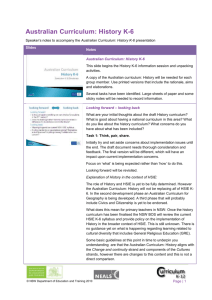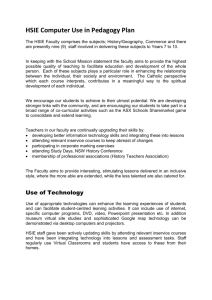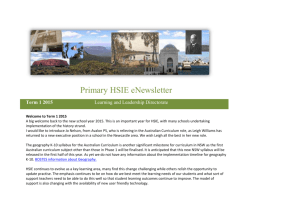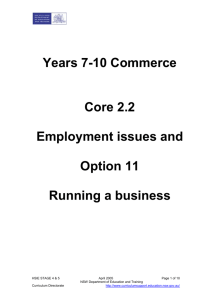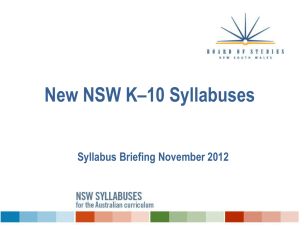Term 4 2013 - Curriculum Support
advertisement
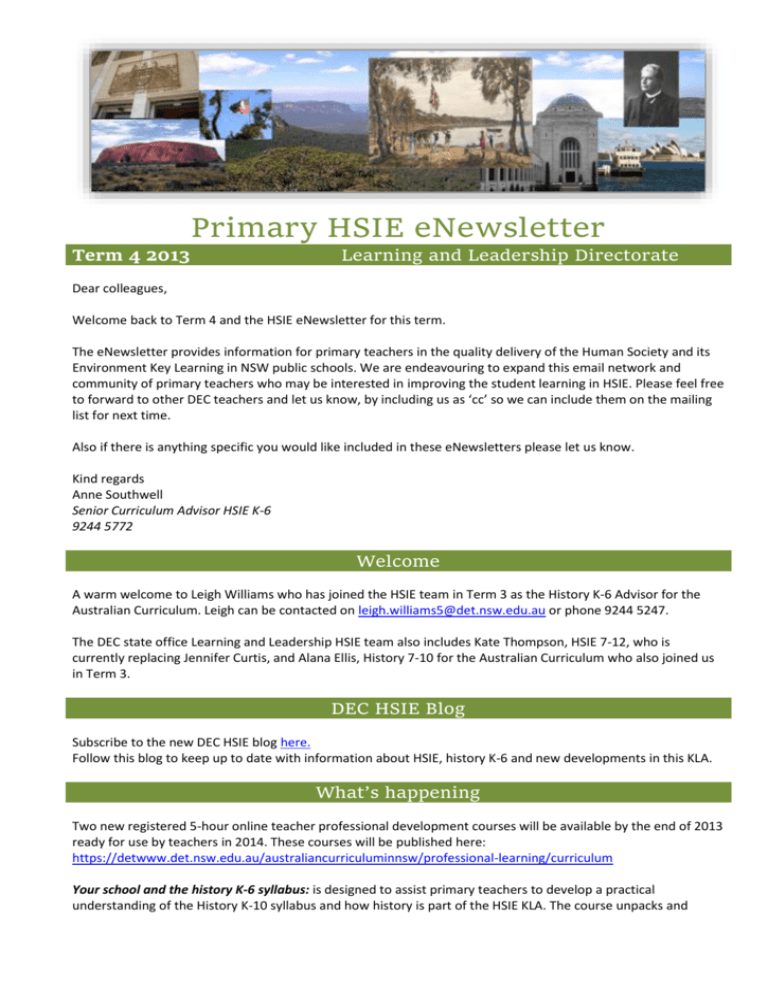
Primary HSIE eNewsletter Term 4 2013 Learning and Leadership Directorate Dear colleagues, Welcome back to Term 4 and the HSIE eNewsletter for this term. The eNewsletter provides information for primary teachers in the quality delivery of the Human Society and its Environment Key Learning in NSW public schools. We are endeavouring to expand this email network and community of primary teachers who may be interested in improving the student learning in HSIE. Please feel free to forward to other DEC teachers and let us know, by including us as ‘cc’ so we can include them on the mailing list for next time. Also if there is anything specific you would like included in these eNewsletters please let us know. Kind regards Anne Southwell Senior Curriculum Advisor HSIE K-6 9244 5772 Welcome A warm welcome to Leigh Williams who has joined the HSIE team in Term 3 as the History K-6 Advisor for the Australian Curriculum. Leigh can be contacted on leigh.williams5@det.nsw.edu.au or phone 9244 5247. The DEC state office Learning and Leadership HSIE team also includes Kate Thompson, HSIE 7-12, who is currently replacing Jennifer Curtis, and Alana Ellis, History 7-10 for the Australian Curriculum who also joined us in Term 3. DEC HSIE Blog Subscribe to the new DEC HSIE blog here. Follow this blog to keep up to date with information about HSIE, history K-6 and new developments in this KLA. What’s happening Two new registered 5-hour online teacher professional development courses will be available by the end of 2013 ready for use by teachers in 2014. These courses will be published here: https://detwww.det.nsw.edu.au/australiancurriculuminnsw/professional-learning/curriculum Your school and the history K-6 syllabus: is designed to assist primary teachers to develop a practical understanding of the History K-10 syllabus and how history is part of the HSIE KLA. The course unpacks and explains the elements of the new history syllabus, provides tools to undertake an audit of units, resources and professional development required to support implementation. The course deliverable is an implementation action plan. A process for programming a unit of learning for history K-10: this course provides support for planning and programming history K-10, with specific information, activities and support for K-6, including planning history as part of HSIE K-6 and the integration of history with the other strands of HSIE. The course deliverable is a history teaching and learning program using Program Builder. Building capacity resources: These resources are 2 hour modules that deal with the new and challenging aspects of the new history syllabus strand of HSIE. They are designed to enhance primary teachers’ expertise in teaching history. The three history K-6 capacity building resources are: 1. Historical concepts and skills 2. Using digital sources to build historical narrative 3. Using historical inquiry in the primary classroom. Australian curriculum update HSIE aligns with the Australian Curriculum ‘Humanities and Social Sciences’ which includes the subjects of history K-10, geography K-10, civics and citizenship years 3-10, and economics and business years 5-10. The Geography K-10 curriculum has recently been released by ACARA. The Board of Studies NSW has just commenced the development of a Geography K-10 syllabus. We are hopeful that this NSW geography syllabus for the Australian curriculum will be ready for implementation with history K-10 in 2016. However, there are a number of steps in the development process before this can happen. It is anticipated that DEC will undertake consultation and provide constructive feedback to the Board of Studies NSW on the draft geography syllabus in 2014. If you are interested in being part of a focus group, please send me your details anne.southwell@det.nsw.edu.au or phone 9244 5772. I am also trying to identify primary teachers who have some tertiary training in geography, please contact me for information. Until there are further Board of Studies announcements, NSW teachers are only responsible for implementing the four Australian Curriculum subjects, including history, for which NSW syllabuses have been developed here. DEC projects Learning and Leadership is currently working with selected schools and teachers on two projects. These projects are designed to inform the development of policy and curriculum implementation support models. Integrated Curriculum Learning Design Project This is a collegial project with teachers working with at least one other school. Significant discussions are occurring around ‘What is integration?’ and ‘What does it look like in practice?’ to inform the development and implementation of integrated student learning. Schools are currently implementing and evaluating the teaching of their integrated learning topic. Differentiated Learning Project The schools involved in this project are at the initial planning stage, with work on the project timeline and end product well underway. Professional development courses on Integrated Learning and Differentiated Learning will also be developed as a result of these projects. Support for teachers Feedback from teachers indicates that finding and evaluating sources and resources that enhance their own background knowledge or support student learning in HSIE are time consuming and difficult to find. To support teachers, carefully curated Pinterest boards are being put together. HSIE Pinterest boards: 1. Commemorating World War I Centenary 2. History: Digital Sources 3. History: Early Settlement 4. History: Changing Technologies Revisiting these boards is encouraged as they continue to be added to and edited. Teachers are also encouraged to develop their own personal boards, which could be organised according to HSIE topics. Additional boards are planned and currently under construction. NSW Public Schools Centenary of World War I Commemorations: Bringing Communities Together (2014-2018) As you begin planning for 2014, do consider how the school can engage in this significant centenary event. There will be a variety of DEC events around the commemoration of WWI; however the commemoration provides the opportunity for schools to connect with their local community in a meaningful way that supports student learning. Some classroom ideas based on a HSIE curriculum mapping include: Early stage 1: engage with family stories, photos and artefacts from the era; students contribute to a commemorative garden or memorial tree planting. Stage 1: locate and investigate a local war memorial; develop an understanding of what life was like for children of the same age during 2014 -2018. Stage 2: history and the role of the Red Cross in WWI and the present role of the Red Cross; the role of volunteers on the home front in WWI; origins and people in the local community and the role they played in various wars; the history of remembrance and commemorations in the local community. Stage 3: the role of WWI in shaping Australian identities; ‘adopt’ a veteran from local honour board/war memorial and research their history. Use the Register of War Memorials in NSW to see if your local war memorial has been registered. If your local war memorial or school honour board has not been registered this could be a good starting point. There are a number of Honour Boards recording NSW public school teachers who served in WWI at DEC Bridge Street office. Public School Teachers World War I Honour Roll Public School Teachers who Served Abroad World War I Honour Roll Department of Education Brother Officers WWI Honour Board Sydney, Department of Education, Hereford House Reunion Club, Teachers College WWI Roll of Honour HSIE Q&A What can I do now to begin preparing for the implementation of history K-6? There are several things that teachers can do now to support implementation and enhance teaching and learning practice. Such as: develop a relationship with the HSIE faculty at your local high school and liaise with the history teachers about aspects of the history syllabus and the teaching of history as a discipline engage with the building capacity resources undertake the online courses Your school and the history K-6 syllabus and A process for programming a unit of learning for history K-10 interact with the resources and courses to ensure familiarity with the history K-6 syllabus for the stage(s) you teach become familiar with Program Builder which with a little bit of practise, will considerably reduce the amount of time spent on planning and programming dip in and out of the resources and courses regularly for clarification, as you become more familiar with, and use the history syllabus. The key historical concepts, historical skills and using historical inquiry are the elements of history teachers without training, in the teaching of history, could find challenging. Using the concepts, skills and historical inquiry with the outcomes and content of the familiar Change and continuity strand of HSIE K-6 syllabus will greatly assist in practising how to use these elements of history and support a smooth transition to the content described in the history syllabus. Matthew Flinders and his map The year 2014 marks 200 years since the publication of the map Terra Australia or Australia, by Matthew Flinders. This led to the continent and our nation being called Australia. A separate flyer is attached with additional information that can be distributed. Here are some useful links: Australia on the Map - http://www.australiaonthemap.org.au/ ABC - http://www.abc.net.au/navigators/captains/journeymaps/default.htm State Library of South Australia http://www.slsa.sa.gov.au/encounter/flinders/maps.htm Australian Government - http://australia.gov.au/about-australia/australian-story/mappingaustralias- coastline My Place for teachers - http://www.myplace.edu.au/TLF_resources/R6569/description.html Useful links Subscribe Curriculum support Board of Studies Implementation support for the Australian Curriculum Contact us Unsubscribe If you do not wish to receive further eNewsletters or information from the HSIE Advisors at the DEC Learning and Leadership Directorate, Early Learning and Primary Education (HSIE), please email here.
